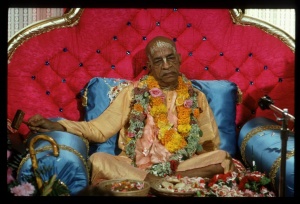CC Madhya 19.168: Difference between revisions
m (1 revision(s)) |
No edit summary |
||
| Line 1: | Line 1: | ||
{{ | [[Category:Sri Caitanya-caritamrta - Madhya-lila Chapter 19|C168]] | ||
<div style="float:left">'''[[Sri Caitanya-caritamrta|Śrī Caitanya-caritāmṛta]] - [[CC Madhya|Madhya-līlā]] - [[CC Madhya 19|Chapter 19: Lord Śrī Caitanya Mahāprabhu Instructs Śrīla Rūpa Gosvāmī]]'''</div> | |||
<div style="float:right">[[File:Go-previous.png|link=CC Madhya 19.167|Madhya-līlā 19.167]] '''[[CC Madhya 19.167|Madhya-līlā 19.167]] - [[CC Madhya 19.169|Madhya-līlā 19.169]]''' [[File:Go-next.png|link=CC Madhya 19.169|Madhya-līlā 19.169]]</div> | |||
{{CompareVersions|CC|Madhya 19.168|CC 1975|CC 1996}} | |||
{{RandomImage}} | |||
==== TEXT 168 ==== | ==== TEXT 168 ==== | ||
<div | <div class="verse"> | ||
anya-vāñchā, anya-pūjā chāḍi’ ‘jñāna’, ‘karma’ | :anya-vāñchā, anya-pūjā chāḍi’ ‘jñāna’, ‘karma’ | ||
ānukūlye sarvendriye kṛṣṇānuśīlana | :ānukūlye sarvendriye kṛṣṇānuśīlana | ||
</div> | </div> | ||
| Line 12: | Line 16: | ||
==== SYNONYMS ==== | ==== SYNONYMS ==== | ||
<div | <div class="synonyms"> | ||
anya- | ''anya-vāñchā''—other desires; ''anya-pūjā''—other types of worship; ''chāḍi’''—giving up; ''jñāna''—material knowledge; ''karma''—material activities; ''ānukūlye''—favorably; ''sarva-indriye''—with all the senses; ''kṛṣṇa-anuśīlana''—cultivation of Kṛṣṇa consciousness. | ||
</div> | </div> | ||
| Line 19: | Line 23: | ||
==== TRANSLATION ==== | ==== TRANSLATION ==== | ||
<div | <div class="translation"> | ||
“A pure devotee must not cherish any desire other than to serve Kṛṣṇa. He should not offer worship to the demigods or to mundane personalities. He should not cultivate artificial knowledge, which is devoid of Kṛṣṇa consciousness, and he should not engage himself in anything other than Kṛṣṇa conscious activities. One must engage all one’s purified senses in the service of the Lord. This is the favorable execution of Kṛṣṇa conscious activities. | “A pure devotee must not cherish any desire other than to serve Kṛṣṇa. He should not offer worship to the demigods or to mundane personalities. He should not cultivate artificial knowledge, which is devoid of Kṛṣṇa consciousness, and he should not engage himself in anything other than Kṛṣṇa conscious activities. One must engage all one’s purified senses in the service of the Lord. This is the favorable execution of Kṛṣṇa conscious activities. | ||
</div> | </div> | ||
__NOTOC__ | |||
<div style="float:right; clear:both;">[[File:Go-previous.png|link=CC Madhya 19.167|Madhya-līlā 19.167]] '''[[CC Madhya 19.167|Madhya-līlā 19.167]] - [[CC Madhya 19.169|Madhya-līlā 19.169]]''' [[File:Go-next.png|link=CC Madhya 19.169|Madhya-līlā 19.169]]</div> | |||
__NOTOC__ | |||
__NOEDITSECTION__ | |||
Revision as of 11:40, 3 September 2021

A.C. Bhaktivedanta Swami Prabhupada
TEXT 168
- anya-vāñchā, anya-pūjā chāḍi’ ‘jñāna’, ‘karma’
- ānukūlye sarvendriye kṛṣṇānuśīlana
SYNONYMS
anya-vāñchā—other desires; anya-pūjā—other types of worship; chāḍi’—giving up; jñāna—material knowledge; karma—material activities; ānukūlye—favorably; sarva-indriye—with all the senses; kṛṣṇa-anuśīlana—cultivation of Kṛṣṇa consciousness.
TRANSLATION
“A pure devotee must not cherish any desire other than to serve Kṛṣṇa. He should not offer worship to the demigods or to mundane personalities. He should not cultivate artificial knowledge, which is devoid of Kṛṣṇa consciousness, and he should not engage himself in anything other than Kṛṣṇa conscious activities. One must engage all one’s purified senses in the service of the Lord. This is the favorable execution of Kṛṣṇa conscious activities.